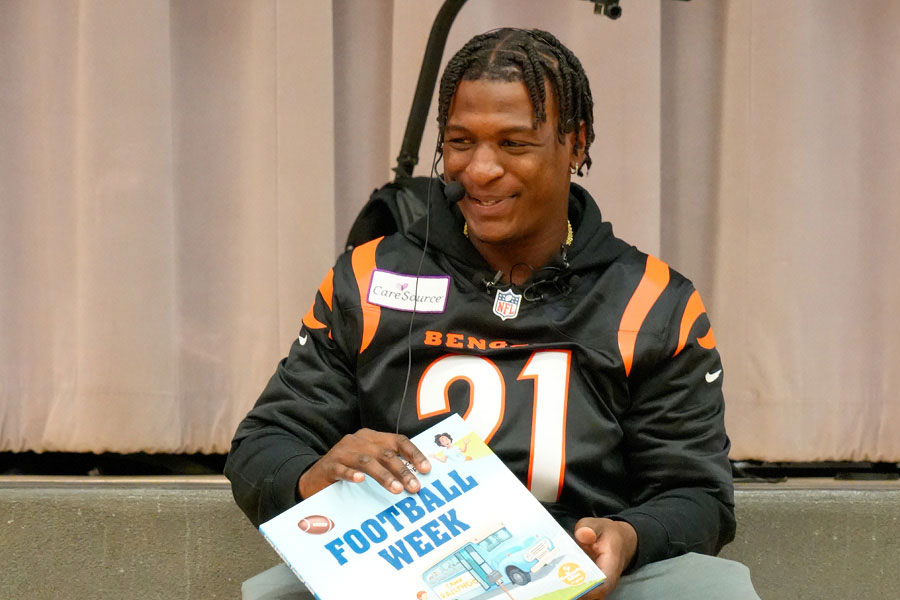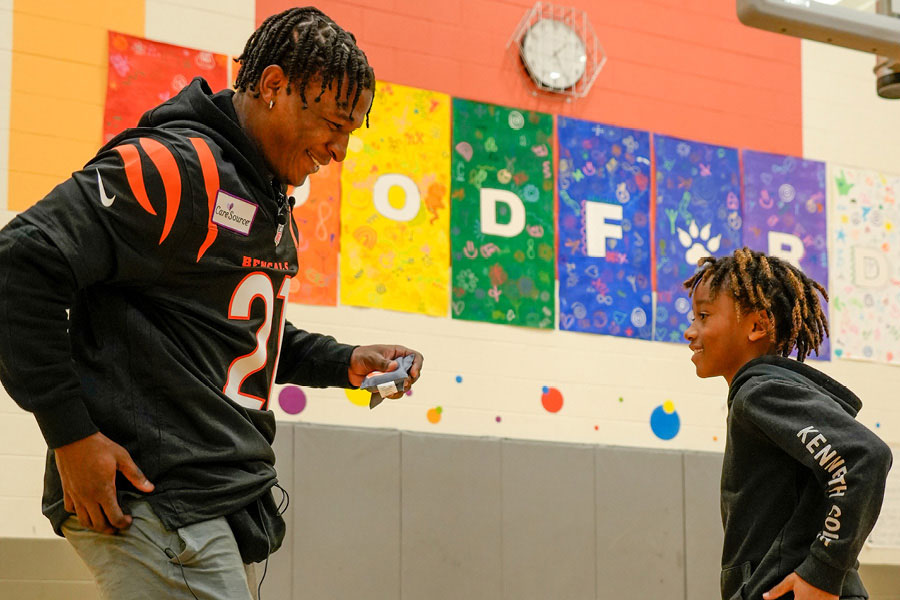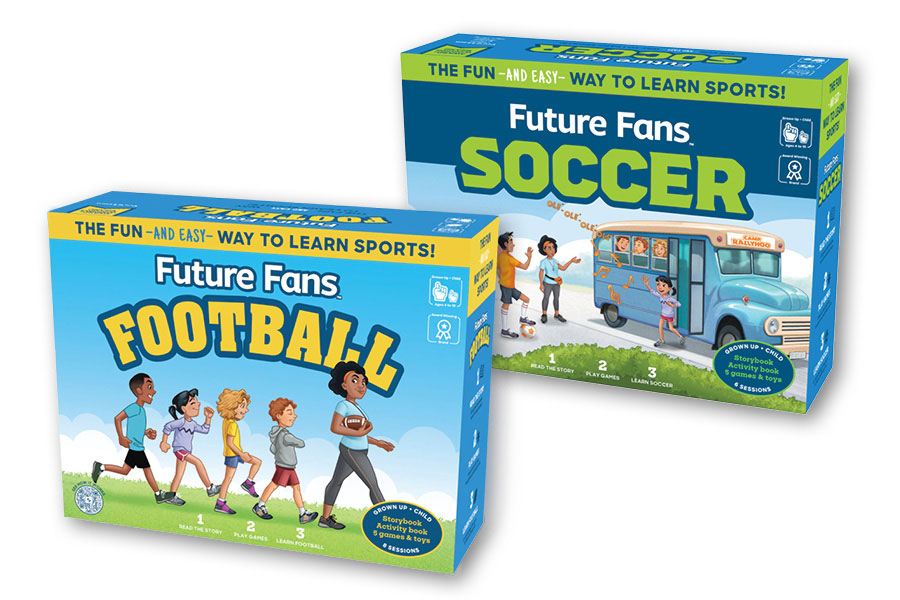A New Playbook for Parenting: How Future Fans Helps Kids Actually Understand Sports

Most kids love the pageantry of sports—the snacks, the jerseys, the chants— but holding their attention once the game starts is a whole different challenge.
On Feb. 13, 2022, Mike Schroder, BS’06, was overjoyed to see his beloved Cincinnati Bengals return to the Super Bowl for the first time in 33 years. But the celebration was bittersweet. His 5-year-old daughter, Ella, had no interest in watching the big game with him.
“I’d been trying to teach Ella since she’d come into this world about how football works, but nothing was working,” he says.
What struck him most was the contrast: Just six months earlier, Ella had learned how to play chess—yet the “chess match” unfolding on the football field still felt out of reach.
The key difference, Schroder realized, was the teaching method. Thanks to Story Time Chess, a game that uses “engaging narratives and lovable characters,” Ella absorbed the fundamentals of chess in a way that was fun and easy to remember.

In 2023, former Cincinnati Bengals cornerback Mike Hilton, who now plays for the Indianapolis Colts, visited the Woodford Academy in Cincinnati to read the Future Fans storybook to first graders.
Schroder’s epiphany sparked the idea for Future Fans—an interactive, storybook-led experience for kids and parents that weaves the fundamentals of sports into playful stories, games, and rhymes.
Alongside his friend and fellow dad, Michael Gold, Schroder co-founded Future Fans in 2023, first bringing to market a consumer product centered around, you guessed it, football.
The Future Fans Football box is packed with surprises, all tied to a football-themed story set at Camp Rallyhoo, a summer day camp. Parents and kids read a chapter together, then pause to open a surprise that makes the story come alive.
For example, one activity is a beanbag toss that mimics downs and scoring, helping children understand the rules of football without relying on traditional terminology.
Schroder describes the game like this: a row of hoops is laid out on the ground, and the “camper” starts in the first one with four numbered beanbags. They get four chances to toss a beanbag into the next hoop. Each successful throw lets them move forward, earning another set of four tries at the following hoop.
“If they get into the last hoop, they get six points and get to dance the ‘Scratchy Bottom Hop,’ which is the celebration dance at Camp Rallyhoo,” he says.

Mike Hilton teaches students to play the Future Fans beanbag toss during his visit to the Woodford Academy in 2023.
As girl dads, it was important to Schroder and Gold that Future Fans was geared toward both sexes. Camp Rallyhoo’s lead counselor across all sports is a woman named Cara, and in the football book, the lead campers are twins named Connor and Katie.
After six storybook sessions, kids open one last surprise: an activity book, which includes game-watch score sheets and bingo cards, perfect for following along with football on TV or at the stadium.
While developing Future Fans, Schroder often turned to Ella as his test subject. He realized the product’s success in January 2023, as he prepared to attend the AFC Championship between the Bengals and the Kansas City Chiefs.
“Ella looked at me and says, ‘Daddy, please don't go. All I want to do is watch the game with you.’ I canceled on my brother, and she and I took in what was a heartbreaking loss on our couch together,” Schroder recalls. “At the end of the day, that's what we're selling.”
The Future Fans line also includes a soccer edition, built on the same concept as football and designed to teach kids the fundamentals of boundaries, positions, corner kicks, and more. Schroder and Gold are already eyeing future expansions into baseball, hockey, and basketball.
Aside from selling their physical products, Future Fans has partnered with professional sports teams to bring its storybook-based sports education to classrooms and communities. The Cincinnati Bengals use a shortened version of the storybook in first-grade classrooms—players read to the students, lead football-based activities, like the beanbag toss, and even teach the “Scratchy Bottom Hop.”
Soccer teams, like the LA Galaxy and FC Cincinnati, have done the same, and the Indianapolis Colts have adapted the Future Fans curriculum for their fan activations in Germany.

A Future Fans box costs $59.99—a price Schroder admits may cause some sticker shock. But he encourages parents to compare it to the expense of taking the whole family to a sporting event, only to leave at halftime when the kids lose interest. The Future Fans motto is: “$60 one time, fan for life.”
“What we're building will help traditional leagues, like the NFL, grow fandom here domestically, but also abroad. Future Fans is applicable to a broader audience than just kids,” Schroder says, adding that he simply couldn’t ask for a better job as a major sports fan.
Based in Columbus, Ohio, where he is raising his family, Schroder has also seen Future Fans make a local impact. The Columbus Urban League purchased 60 boxes to help formerly incarcerated men reconnect with their children and support their reintegration into society.
“We serve the sports industry in a way that I feel really good about,” he continues. “There's nothing like sports and the bonds and connections it creates, and to be able to contribute even a little bit towards that at a macro level, or more importantly, a micro level within somebody's family, I’m very grateful that I get to do it.”
Written By
Samantha Stutsman
Samantha Stutsman, BAJ’14, is a Bloomington, Ind., native and freelance writer. She has written for publications including PEOPLE, Indianapolis Monthly, and the IU Alumni Magazine.